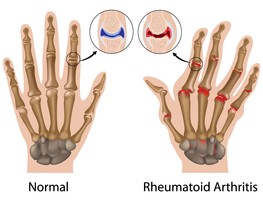

What is Rheumatoid Arthritis
Rheumatoid arthritis (RA) is an autoimmune disease in which one’s own immune system attacks the normal healthy synovial linings in a person’s joints. This  immune system response results in chronic inflammation and possible joint destruction. Although rheumatoid arthritis has no specific known cause, experts agree that there are underlying genetic and hormonal factors which make certain individuals more susceptible to developing RA. It appears that some environmental factor such as a viral or bacterial infection then triggers the onset of RA and its symptoms.
immune system response results in chronic inflammation and possible joint destruction. Although rheumatoid arthritis has no specific known cause, experts agree that there are underlying genetic and hormonal factors which make certain individuals more susceptible to developing RA. It appears that some environmental factor such as a viral or bacterial infection then triggers the onset of RA and its symptoms.
Risk Factors
Signs and Symptoms of Rheumatoid Arthritis
Symptoms typically start between the ages of 40-60 years, though they may start earlier. RA symptoms are usually felt throughout the body, and are most common in the hands and feet. Affected joints typically become sore, swollen, and warm to the touch. Other symptoms of RA may include general fatigue, or persistent fever.
Diagnosis and Examination
The first step in diagnosing RA is to see a doctor. This may be your primary care physician or a doctor who specializes in the treatment of RA called a rheumatologist. A combination of past medical history, physical examination, and medical tests including X-rays and blood tests are used to diagnose the condition of rheumatoid arthritis.
Treatment
All treatment regimens should be coordinated with you, your doctors and rehabilitation specialists such as physical and occupational therapists. Treatment options for rheumatoid arthritis include both conservative measures and surgical options. Conservative treatment options include physical therapy, and moderate exercise; both of which have shown to be beneficial to control symptoms and maintain an active lifestyle.
If RA affects the hands and wrists, one should consult a certified hand therapist for therapy and splinting options. The use of over the counter medications such as ibuprofen and aspirin can help control the inflammatory symptoms of RA. Prescription medications are also used to treat RA symptoms.
Orthopedic surgery can provide pain relief and restore lost joint function. Surgery will be performed only when non-surgical treatment options do not work. Surgical options could include total joint replacement and tendon repair to affected joints.
Copyright © www.orthopaedics.win Bone Health All Rights Reserved